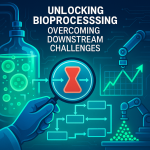🧪 Microfluidic technologies offer high precision and scalability, making them ideal for handling small, customized batches efficiently.
💰 These systems can cut costs by using smaller quantities of reagents and minimizing waste.
🤖 Combining microfluidics with AI-based monitoring and automation can further optimize the purification process.
💉 Overall, microfluidics and AI are pushing the boundaries of biopharmaceutical processing.
Introduction:
Researchers argue that the personalized medicine sector should look to microfluidics for purification processes. Bioprocessing technologies designed for volume products are not well suited for small batch personalized medicines, which require better purification systems. The current purification methods focus on separating biopharmaceuticals from cellular debris and nutrients, but personalized medicines made in smaller quantities have different challenges. The purification process for such medicines must be efficient and ensure purity for safety and effectiveness. Additionally, these technologies need to be flexible, precise, and cost-effective to meet quality and regulatory requirements.
- The personalized medicine industry needs new purification technologies because they handle complex biological molecules that must be extremely pure for safety and effectiveness.
- Current technologies are not flexible or precise enough for small, individualized batches, leading to inconsistent quality and higher production costs.
- Microfluidics, which involve processing smaller volumes, offer high precision and scalability for purifying personalized medicines efficiently.
- Microfluidics can cut costs by using smaller quantities of reagents and minimizing waste while achieving high-resolution separation for closely related biomolecules.
- The combination of microfluidics and automated artificial intelligence (AI) based monitoring and analytics can optimize the production process, improve quality, and manage costs.
Conclusion:
Personalized medicine developers should consider using microfluidics for downstream processing and purification. These systems offer high precision, scalability, and cost reduction, making them ideal for purifying small, customized batches of personalized medicines. By combining microfluidics with AI and automation technologies, the industry can push the boundaries of biopharmaceutical processing, improve efficiency, and ensure consistent quality.



